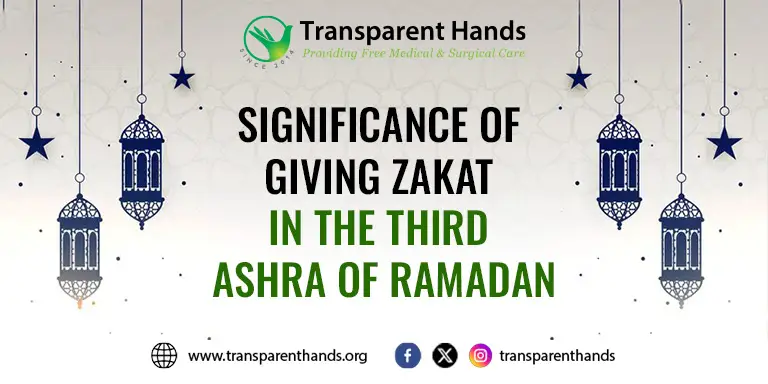Significance of Giving Zakat in the Third Ashra of Ramadan

Zakat can be given at any time of the year. However, according to a study conducted by PEW, the majority (a median of 77%) of Muslims chose to give their Zakat during Ramadan. The significance of giving Zakat in Islam is so great that it is considered to be the third pillar of Islam. This article will explore why Muslim piety peaks in Ramadan and why most of us give Zakat during this Holy Month, especially in the last Ashra of Ramadan.
The Power of Giving Zakat in Islam
Giving Zakat in Islam is one of the most fundamental duties of Muslims who are eligible for it. Zakat is a very powerful philanthropic source, and according to a study conducted by UNDP, the annual Zakat pool is estimated to be as high as US $1 trillion, which can potentially change millions of lives. Thus, Zakat is an individual act that can have a very powerful collective impact.
Your Ramadan Donations Can Heal Lives
What is Zakat and How is it Connected with Ramadan?
Giving Zakat in Islam is mandatory for all adult and sane Muslims who possess the Nisab, which is equal to 612.36 grams or 52.5 tola of silver. The purpose of giving Zakat is to attain and practice Taqwa, a quality of having a fear of Allah (SWT). Believers are urged to give Zakat every lunar year.
The Quran tells us:
“And establish prayer and give Zakah and bow with those who bow [in worship and obedience].” (Surat Al-Baqarah, 02:43)
In the following verses, believers are urged to be charitable and asked to remain respectable about it.
“Those who spend their wealth in the way of Allah and then do not follow up what they have spent with reminders [of it] or [other] injury will have their reward with their Lord, and there will be no fear concerning them, nor will they grieve.” (Surat Al-Baqarah, 2: 262)
The last Ashra of Ramadan heralds safety from hellfire. Zakat also provides safety from Hell-fire according to the following Hadith:
Adi bin Hatim (May Allah be pleased with him) reported: Messenger of Allah (ﷺ) said, “Protect yourself from Hell-fire even by giving a piece of date as charity.” [Al-Bukhari and Muslim]. (Riyad as-Salihin, 545)
Learn How Transparent Hands Can Help With Your Zakat Calculation
The supplication for the last Ashra of Ramadan is as follows:
“O Allah, save me from the fire (Jahannam)”
اللَّهُمَّ إِنِّي أَسْأَلُكَ رِضَاكَ وَالجَنَّةَ ، وَأَعُوذُ بِكَ مِنْ سَخَطِكَ وَالنَّارِ
Hence, giving Zakat during the last Ashra aligns with the motive of safety from the fires of hell.
Is it necessary to pay for Zakat during Ramadan?
While many Muslims choose to pay Zakat during Ramadan, there is no fixed date for doing so. Zakat can be paid at any time of the year, in installments or in advance. However, it is an annual (according to the Islamic lunar year) obligation due on the anniversary of the first Zakat giving. Hence, to pay Zakat during the last Ashra of Ramadan, one might have to pay it in advance. However giving Zakat in the third ashra is a preference for many Muslims, worldwide.
What’s the motivation for giving Zakat during the last Ashra?
The third and last Ashra of Ramadan has great significance for Muslims since it carries one of the most anticipated and blessed nights of the year for Muslims.
A whole chapter is devoted to Laylatyl Qadr.
“The Night of Decree is better than a thousand months” (Surat Al-Qadr, 97, 3)
That means that any act of devotion done during Laylatul Qadr is equal to doing the same act for a thousand months. The exact date of Laylatul Qadr is not known. However, Hadith indicates that the night falls in the last Ashra of Ramadan.
According to a Hadith the Laylatul Qadr falls on the odd-numbered nights of the last ten days of Ramadan.
“Abbas said: Umar said: The Messenger of Allah (ﷺ) said: “Whoever among you is seeking Laylatul Qadr, let him seek it in the odd-numbered nights of the last ten days of Ramadan.” (Musnad Ahmad, 298)
One way to ensure the great rewards of Laylatul Qadr is to give Zakat and Sadaqah during the last Ashra. Even a small amount of charity to Laylatul Qadr will make one eligible for great rewards.
Donate to Transparent Hands
Transparent Hands is one of the leading crowdfunding platforms in Pakistan, and it is dedicated to providing surgical and medical assistance to those in need. We arrange medical camps and provide surgical treatments to deserving people who cannot access healthcare due to financial hardships. We ensure that our unique online platform keeps our donors and supporters informed and updated about the progress of the patients they support. You can make online donations from anywhere in the world with the confidence that your donations will empower deserving people. This Ramadan, you can make a meaningful impact with your Zakat and Sadaqah by donating to Transparent Hands.
Conclusion:
Giving Zakat in Islam is a fundamental duty and a common practice in the Muslim world. Ramadan holds profound spiritual significance for Muslims. The Quran was revealed in Ramadan, and Muslims fast during Ramadan, during which they abstain from food, drinks, physical intimacy, and all kinds of immoral acts. While fasting is tied to Ramadan, Zakat can be paid any time of year. However, most Muslims pay Zakat during Ramadan. One of the reasons for that is Laylatul Qadr, which promises great rewards for acts of devotion and charity.
Learn More:
Benefits of Giving Zakat al-Fitr
The Benefits of Giving Zakat in Ramadan
Who is Eligible to Receive Zakat al-Fitr?











Leave Your Comments